Thesis Capstone 2022

Welcome to the Graduate Exhibition & Experience Design Thesis Capstone 2022!
The adjudication of the students' work took place in person on Dec 9th, 12–5:00pm
with a celebratory Evening Reception. Read the coverage on Exhibit City News.
Exhibition and Experience Design 2022 MA Candidates
Click the green menu button at the top right of this page for more information
Zuzanna Zmijewska-Walczak
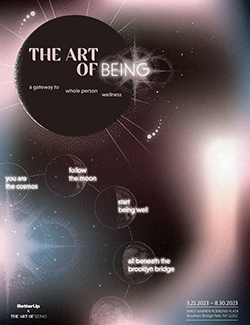
91% of post-millennials report facing emotional challenges associated with stress, depression, and anxiety, and are seeking forms of well-being, particularly in self-awareness, life affirmations, and community. The study of TikTok's ease of access and micro-communities can be used as a modality to amplify the positive psychological aspects of the whole-person approach to wellness. This can occur via fostering empowerment through the eight dimensions of wellness, allowing people to feel safe in the exploration of mindfulness practices. Community-driven wellness can be harnessed by designers and drive spatial experience, creating opportunities to further connect post-millennials to inner healing and well-being.
Zuzanna's Design Development Documentation
Judges: If you missed the live presentation, you can view it now.
Client: BetterUp
Venue: Emily Warren Roebling Plaza
Audience: Primary: Gen Z | Ages 10-25
Secondary: Rechargers + Explorers | ages 18+
Tertiary: Experience Seekers | all ages
Email: [email protected]
LinkedIn: https://www.linkedin.com/in/zuzannazmi/
Natalie Henson
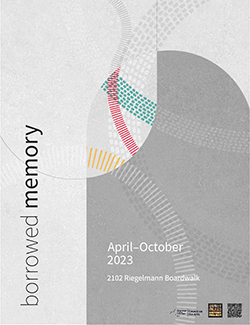
Immersive virtual experiences and games have been shown to build self-efficacy, perspective-taking, and empathy in participants through devices such as avatar-like embodied experiences and collaboration within the environment. Increased fluidity between virtual and physical worlds presents two potential opportunities within exhibition design. First, layering immersive experiences into physical designs can promote perspective-taking and collaborative behavior. Second, engaging in perspective-taking and collaboration with audiences throughout the design process can increase inclusivity in layered virtual and physical spaces. This approach can remove barriers to understanding viewpoints that conflict with one’s own perspectives, create opportunities for museums to engage meaningfully with new audiences, and promote deeper understanding among community members.
Natalie's Design Development Documentation
Judges: If you missed the live presentation, you can view it now.
Client: Coney Island History Project
Sponsor: New York State Council on the Arts
Collaborator: Wevr Labs
Venue: Coney Island Boardwalk
Audience: Primary: South Brooklyn Residents
Secondary: Young adults and teens
Tertiary: Tourists
Email: [email protected]
Emily Schmidt
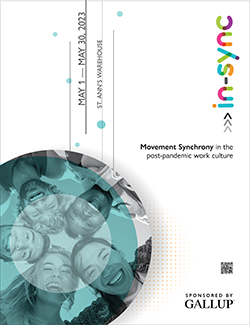
The COVID pandemic may be the most challenging crisis many leaders in the work world have faced. It has profoundly changed the landscape of our work culture and dramatically shifted how organizations operate, and leaders lead. The new post-pandemic norm affects employees' social bonding, trust, productivity, loyalty, and collective mental health. Movement Synchrony measures the mutual influence that occurs in interpersonal interaction. It has been proposed to embody the quality of relationships. Exhibitions can provide a solution for leaders by incorporating the advantages of Movement Synchrony and putting forth new perspectives including flexibility and adaptability, and promoting naturally occurring happy hormones: Dopamine, Oxytocin, Serotonin, and Endorphin.
Emily's Design Development Documentation
Judges: If you missed the live presentation, you can view it now.
Client: Gallup
Venue: St. Ann’s Warehouse, Dumbo, Brooklyn
Audience: Primary: Leaders
Secondary: Their employees
Tertiary: General public
Email: [email protected]
LinkedIn: https://www.linkedin.com/in/emily-schmidt-2aaa4974/
Gracie Woelkers
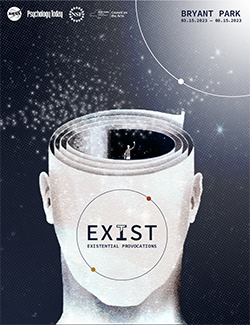
Existentialism is the exploration of one’s own existence and has the power to provoke insight for purpose and meaning in life. Through the use of scale and orientation, solitude, and emotion, designers can translate into space the existential concepts of freedom, individuality, and authentic choice that lead to reflection of one’s own relationship with the world. Multisensory environments that follow this format and allow for personal interpretation can stimulate an existential sense of personal responsibility, therefore encouraging prosocial behavior.
Gracie's Design Development Documentation
Judges: If you missed the live presentation, you can view it now.
Client: NASA & Psychology Today
National Science Foundation (NSF)
New York State Council on the Arts (NYSCA)
Venue: Bryant Park
Audience: Primary: 18 - 25 year olds; emerging adults, people who are busy on the day-to-day
and have a hard time stepping out of their own lives and bubbles
Secondary: 30 - 40 year olds; adults settling down
Tertiary: 50 - 60 year olds; adults in midlife
Email: [email protected]
Hansa Hatrote
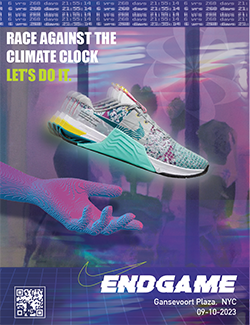
The devastating impacts of current and emerging technology on our environment demand a deeper look into how people think about its role in climate change. A comprehensive understanding of metacognition reveals how humans conceptualize complex environmental crises. Sustainably designed ‘phygital’ experiences that harness these strategies and incorporate metaverse technologies can model climate-conscious practices while blurring the line between physical and extended reality experiences. This is vital as we explore the new age of digital media.
Hansa's Design Development Documentation
Judges: If you missed the live presentation, you can view it now.
Client: Nike Move to Zero
Venue: Gansevoort Plaza, New York City
Audience: Primary: Technology enthusiasts, environmentalists, and Nike loyal customers
Secondary: Experience seekers and explorers
Email: [email protected]
HuaWen Kao
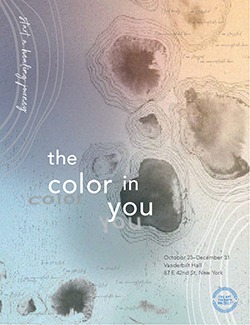
An uncomfortable psychological state resulting from negative emotions diminishes our well-being in everyday life. Sensory perception is a bridge to human emotion and reaction, impacting our body and mind and allowing for greater awareness of mindfulness. Exhibition design that incorporates heightened sensory perception within an interactive storytelling experience can slow people down, enhance mindfulness, provide an entry point to internal cues for emotion, and start a journey toward growth and self-healing.
HuaWen's Design Development Documentation
Judges: If you missed the live presentation, you can view it now.
Client: The Art Therapy Project
Venue: Vanderbilt Hall inside the Grand Central Terminal
Audience: Primary: Employees in New York City
Secondary: Tourists around the world
Email: [email protected]
LinkedIn: https://www.linkedin.com/in/hua-wen-kao-ba00421b3/
Jace Son
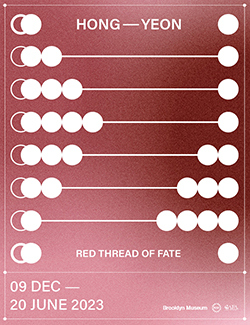
Cognitive impairment can affect the daily lives of older adults, yet the early signs often go unnoticed, which can increase the risk of later developing Alzheimer’s disease and dementia. Immersive experience design can help to raise awareness and build empathy for people suffering from early cognitive impairment leading to dementia. Experiential, emotive, and informative environments with social action elements can foster empathy for those suffering from cognitive impairments, as well as present opportunities to build awareness of the importance of cognitive training for early detection.
Jace's Design Development Documentation
Judges: If you missed the live presentation, you can view it now.
Client: NSF (National Science Foundation) & AFA (Alzheimer’s Foundation of America)
Venue: Brooklyn Museum
Audience: Primary: Family caregivers of people with Alzheimer’s disease and dementia
Secondary: People who suffer from Alzheimer’s disease and dementia
Tertiary: People who have a fear of suffering from Alzheimer’s disease and want to
prevent the disease
Email: [email protected]
LinkedIn: https://www.linkedin.com/in/jace-son/
Jaipreet Uppal
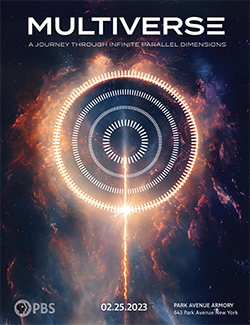
The Multiverse theory suggests that our universe, which consists of billions of planets, stars and galaxies, may not be the only universe that exists. The theory proposes that parallel universes have unlimited possibilities, such as other regions existing in the same space time as that of our universe, but they are disconnected permanently from our own pocket universe, and within each of them the laws of physics are different. By integrating the ideology of the multiverse theory into designed environments through enhanced sensory experiences and altered perceptions, designers can create stimulating experiences that are transformative for visitors.
Jaipreet's Design Development Documentation
Judges: If you missed the live presentation, you can view it now.
Client: PBS
Venue: Park Avenue Armory
Audience: Primary: Young Adults Gen Z- Millennials
Secondary: Adults Gen X- Boomers
Tertiary: Kids Gen Alpha
Email: [email protected]
LinkedIn: www.linkedin.com/in/Jaipreet-Uppal/
Jami Sparano
Thesis and Project
Sound Playground
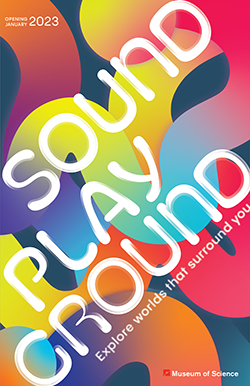
Sound has the power to impact human consciousness on neurological and psychological levels, thus altering our lives more profoundly than we readily acknowledge. Particular sound waves, or frequencies, at the core of soundscapes and musical compositions, influence thoughts, feelings, and expression in ways that directly inform how people will engage with the world around them. By understanding the relationship between sound frequencies and human consciousness, experiential designers can harness the effect(s) soundscapes have in fabricated environments and how they can be composed in order to affect the quality of group dynamics, enhance learning outcomes, and aid in audience wayfinding.
Jami's Design Development Documentation
Judges: If you missed the live presentation, you can view it now.
Client: Museum of Science Boston & National Science Foundation
Venue: Museum of Science Boston
Audience: Primary: Massachusetts 4th-grade students following the state’s Science & Art curriculums
that introduce properties of sound and music
Secondary: Families and caregivers with children
Tertiary: Boston tourists looking for a way to stimulate their visitor experience
Email: [email protected]
LinkedIn: www.linkedin.com/in/jamisparano/
Jenny Hsin-Yi Chang
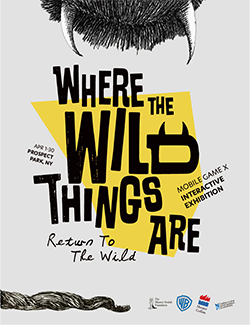
During the COVID-19 pandemic, people experienced an increase in anxiety, depression
and decreased wellbeing as a result of the inability to have meaningful connection
with others in the prolonged social isolation. Shared experiences, as a key element
to forming interpersonal bonds, can be created in remote settings by:
a) creating a sense of shared time and place through synchronous multisensory media,
b) providing opportunities of quality interaction through enabling multimodal interpersonal
communication, and
c) catalyzing the bonding effect through the inclusion of emotional eliciting elements.
By harnessing the power of shared experience in remote settings, brands and museums
will be able to increase the interest level remote audience has for the content, prolong
and deepen the remote engagement, and be prepared for the future audience that will
increasingly rely on remote and virtual means to experience the world.
Jenny's Design Development Documentation
Judges: If you missed the live presentation, you can view it now.
Client: Harper & Row, Warner Bros, Coalition to End Loneliness
Venue: Hybrid – Physical Traveling Exhibition + Virtual Mobile Game
Audience: Primary: Families Secondary: Young Adults (18-35)
Email: [email protected]
Jose Campos Gomez
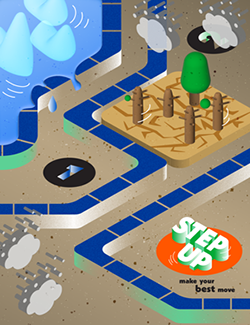
Exhibition and experience design is one of the least environmentally friendly industries. Some pop-up experiences are made to last only for a short time, creating a lot of waste that negatively impacts our planet. However, an architectural theory known as a timeless design could create a framework for changing the aesthetic approach to battle the waste. This concept could ultimately help designers to conceive experiential structures that last longer thanks to modularity.
Jose's Design Development Documentation
Judges: If you missed the live presentation, you can view it now.
Client: Google Sustainability
Venue: Piazza Castello Square, Turin, Italy
Audience: Primary: Parents with children (7-13) Secondary: College students
Email: [email protected]
Joseph DeLaunay
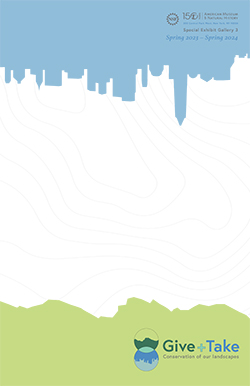
With increasing access to personal devices and technology, people have a higher demand for digital stimulation for enterainment and education. Cognitive load theory illustrates the importance of physicality (called the human movement effect), and the importance of working memory, for information retention. The increase of newer technologies has users engaged with multiple digital sources at once more than ever before. By employing more interactive technologies, alongside traditional media, designers can craft exhibits that satisfy a tech-savvy audience while encouraging longer-lasting retention and understanding of the subject matter at hand.
Joseph's Design Development Documentation
Judges: If you missed the live presentation, you can view it now.
Client: National Science Foundation
Venue: American Museum of Natural History
Audience: AMNH current audience, Tech-savvy young adults, Scholars
Email: [email protected]
Lyka Williams
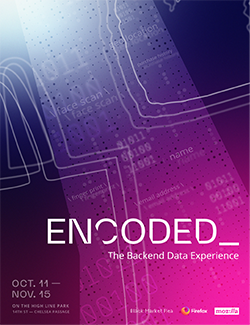
Generation Alpha is the first cohort of digital natives fully born and growing up in our technological data-driven society. As they lacked the ability to consent, there is a blurred notion of their expectations of privacy. As this demographic rises in age and cements itself as the world's newest consumers, the retail industry must quickly evolve to offer a novel approach to consumer-brand connections while balancing their desire for autonomy. Experiential design that incorporates and prioritizes consumer choice via hyper-personalization will cultivate long-term brand loyalty amongst this new generation.
Lyka's Design Development Documentation
Judges: If you missed the live presentation, you can view it now.
Client: Black Market Flea x Mozilla x Firefox
Venue: The High Line
Audience: BIPOC
Primary: Gen Alpha Secondary: Gen Z
Tertiary: Tourists and visitors along the High Line
Email: [email protected]
Linkedin: www.linkedin.com/in/marlykawilliams/
Sarah Felter
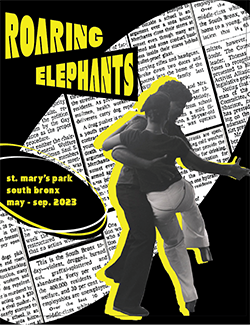
History can feel impersonal and unrelatable as it focuses on the logic of culture rather than the people within them. Through immersive technologies, community memory can be collected and expressed within a new form of archiving. Through immersive technologies, community memory can be collected and expressed within a new form of archiving. This allows for an experience where visitors understand the nuances of memory.
Sarah's Design Development Documentation
Judges: If you missed the live presentation, you can view it now.
Client: Latino Public Broadcasting
Venue: St. Mary’s Park, South Bronx
Audience: Primary: 2nd and 3rd generation Latinos in the South Bronx Secondary: Residents of the South Bronx
Email: [email protected]
Ali McNamara-Marsland
Thesis and Project
Tune-In
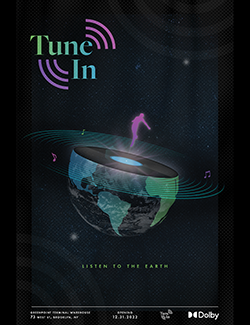
Listening to music releases endorphins in the brain that give us a heightened feeling of euphoria, while also leading to an increase in divergent thinking, a major component of creativity. Designers who wholly understand this phenomenon can more purposefully facilitate divergent thinking. In a world that has become stagnant in our willingness to implement nuanced solutions, this increase in creativity can lead to the individual and collective exploratory problem-solving that is needed to address the issues we are faced with.
Ali's Design Development Documentation
Judges: If you missed the live presentation, you can view it now.
Client: Dolby
Venue: Greenpoint Terminal Warehouse
Audience: Primary: Creators, Thinkers, Problem-Solvers
Secondary: Millennials & Gen Z
Email: [email protected]
LinkedIn: https://www.linkedin.com/in/ali-mac/